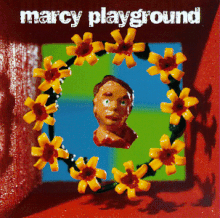Marcy Playground (album)
| Marcy Playground | ||||
|---|---|---|---|---|
 | ||||
| Studio album by | ||||
| Released | February 25, 1997 | |||
| Recorded | 1996–1997 | |||
| Studio | Sabella Recording Studio (Roslyn, New York) | |||
| Genre | ||||
| Length | 34:37 | |||
| Label | Capitol | |||
| Producer | John Wozniak | |||
| Marcy Playground chronology | ||||
| ||||
| Singles from Marcy Playground | ||||
| ||||
Marcy Playground is the eponymous debut studio album by American alternative rock band Marcy Playground, released on February 25, 1997, on EMI.[2] It was reissued later that year on October 7 on Capitol Records with a large amount of promotion for the single "Sex and Candy," which became the band's breakthrough single, spending a then-record 15 weeks at No. 1 on the Billboard Modern Rock Tracks chart.
The album also includes the singles "St. Joe on the Schoolbus" and "Sherry Fraser" both of which received moderate radio and MTV2 airplay.
Critical reception[edit]
| Review scores | |
|---|---|
| Source | Rating |
| AllMusic | |
| Christgau's Consumer Guide | |
| NME | 7/10[5] |
| Pitchfork | 7.6/10[6] |
| The Rolling Stone Album Guide | |
Marcy Playground garnered a mixed reception from music critics. Ronan Munro of NME said that, "What is surprising is how enjoyable this window on Wozniak's soul is: his lazy drawl and gentle melodies coating his misery in a pop sheen... the mood remains resolutely downbeat but the angst is not imposing."[5] James P. Wisdom of Pitchfork stated that Marcy Playground was "the most soothingly mellow and pleasant thing [he] had heard in a long time."[6] AllMusic's Stephen Thomas Erlewine felt that "only a handful" of the album's tracks are as memorable as "Sex and Candy", while adding that "those moments are what make Marcy Playground a promising, albeit imperfect, debut."[3]
Robert Christgau graded the album as a "dud",[4] indicating "a bad record whose details rarely merit further thought."[8] Chuck Eddy of Rolling Stone heavily panned the album for its subpar musicianship, saying that it "sets icky new standards for commercial-post-alternative callowness."[9] Dan Weiss of LA Weekly deemed it the twelfth-worst album of the 1990s, opining that aside from the singles "Sex and Candy" and "Saint Joe on the School Bus," the album is "folksy, opiate-obsessed bullshit".[10]
Track listing[edit]
All tracks are written by John Wozniak, except where noted
| No. | Title | Length |
|---|---|---|
| 1. | "Poppies" | 2:49 |
| 2. | "Sex and Candy" | 2:53 |
| 3. | "Ancient Walls of Flowers" (John Wozniak, Sherry Fraser) | 3:16 |
| 4. | "Saint Joe on the School Bus" | 3:20 |
| 5. | "A Cloak of Elvenkind" | 2:59 |
| 6. | "Sherry Fraser" | 2:50 |
| 7. | "Gone Crazy" | 2:45 |
| 8. | "Opium" | 3:07 |
| 9. | "One More Suicide" | 2:39 |
| 10. | "Dog and His Master" | 2:12 |
| 11. | "The Shadow of Seattle" | 2:48 |
| 12. | "The Vampires of New York" | 2:55 |
Personnel[edit]
Credits adapted from liner notes.[11]
|
Marcy Playground
Additional musicians
|
Production
Additional personnel
|
Charts[edit]
Weekly charts[edit]
|
Year-end charts[edit]
|
Certifications[edit]
| Region | Certification | Certified units/sales |
|---|---|---|
| Australia (ARIA)[20] | Gold | 35,000^ |
| United States (RIAA)[21] | Platinum | 1,000,000^ |
|
^ Shipments figures based on certification alone. | ||
References[edit]
- ^ Applefeld Olson, Catherine, ed. (September 27, 1997). "The Reel Thing: Mammoth Step" (PDF). Billboard. Vol. 109, no. 39. p. 22. Retrieved October 17, 2020.
- ^ "Marcy Playground by Marcy Playground". Apple Music. Retrieved May 19, 2020.
- ^ a b Erlewine, Stephen Thomas. "Marcy Playground – Marcy Playground". AllMusic. Retrieved July 22, 2012.
- ^ a b Christgau, Robert. "CG: Marcy Playground". RobertChristgau.com. Retrieved July 22, 2012.
- ^ a b Munro, Ronan (May 23, 1998). "Marcy Playground – Marcy Playground". NME. Archived from the original on August 17, 2000. Retrieved May 19, 2020.
- ^ a b Wisdom, James P. "Marcy Playground: Marcy Playground". Pitchfork. Archived from the original on June 9, 2002. Retrieved February 6, 2018.
- ^ Harris, Keith (2004). "Marcy Playground". In Brackett, Nathan; Hoard, Christian (eds.). The New Rolling Stone Album Guide (4th ed.). Simon & Schuster. p. 513. ISBN 0-7432-0169-8.
- ^ Christgau, Robert (2000). "Key to Icons". Christgau's Consumer Guide: Albums of the '90s. St. Martin's Press. ISBN 0-312-24560-2. Retrieved August 11, 2016.
- ^ Eddy, Chuck (April 22, 1998). "Marcy Playground: Marcy Playground". Rolling Stone. Archived from the original on October 1, 2007. Retrieved September 7, 2007.
- ^ "The 20 Worst Albums of the '90s: The Complete List". LA Weekly. March 7, 2013. Retrieved March 7, 2019.
- ^ Marcy Playground (liner notes). Marcy Playground. Capitol Records. 1997. 7243-8-53569-2-6.
{{cite AV media notes}}: CS1 maint: others in cite AV media (notes) (link) - ^ "Australiancharts.com – Marcy Playground – Marcy Playground". Hung Medien. Retrieved May 20, 2020.
- ^ "Austriancharts.at – Marcy Playground – Marcy Playground" (in German). Hung Medien. Retrieved May 20, 2020.
- ^ "Top RPM Albums: Issue 3513". RPM. Library and Archives Canada. Retrieved May 20, 2020.
- ^ "Charts.nz – Marcy Playground – Marcy Playground". Hung Medien. Retrieved May 20, 2020.
- ^ "Official Scottish Albums Chart Top 100". Official Charts Company. Retrieved May 20, 2020.
- ^ "Official Albums Chart Top 100". Official Charts Company. Retrieved May 20, 2020.
- ^ "Marcy Playground Chart History (Billboard 200)". Billboard. Retrieved May 20, 2020.
- ^ "Top Billboard 200 Albums – Year-End 1998". Billboard. Retrieved September 21, 2020.
- ^ "ARIA Charts – Accreditations – 1999 Albums" (PDF). Australian Recording Industry Association. Retrieved December 27, 2021.
- ^ "American album certifications – Marcy Playground – Marcy Playground". Recording Industry Association of America. Retrieved November 7, 2021.
